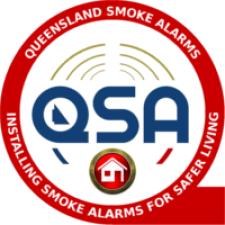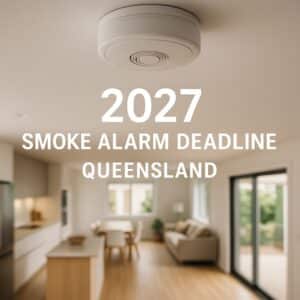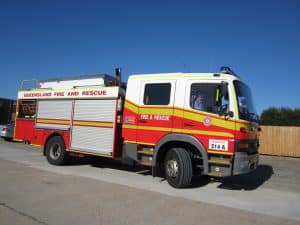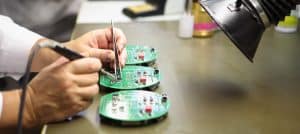Smoke alarms are essential for home safety. They are designed to alert you to a fire before it spreads and can save lives in the process, however, simply installing a smoke alarm is not enough. Regular maintenance is vital to ensure the device functions properly in the event of a fire. Unfortunately, many homeowners neglect smoke detector maintenance, putting themselves and their families at risk.
It’s recommended that you test your smoke detectors at least every 6 months by pressing the test button to make sure the alarms sound. You should also replace the batteries in your smoke alarms at least once a year, or whenever you hear a low battery warning chirp or beep. If your smoke detectors are over 10 years old, it’s time to replace them with new ones. It’s also important to vacuum any dust off your smoke alarms and any bug ingress at least once a year.
What happens when smoke alarms are not maintained?
When smoke alarms are not properly maintained, they can fail to alert you in the event of a fire. This can have catastrophic consequences. For example, if the batteries in your smoke detector die, the device will not function and you won’t be alerted to a fire in your home. Similarly, if your smoke detector is covered in dust or other debris, it may not be able to detect smoke or fire particles in the air. This means that a fire could be raging in your home, and you would have no idea until it is too late.
It’s not just a matter of changing the batteries from time to time. Smoke alarms need to be checked regularly for functionality and cleaned to ensure they are always in good working order. By neglecting to maintain your smoke detectors, you are putting yourself and your family in danger.
Regular maintenance tasks for smoke alarms
Here are some important maintenance tasks you should perform regularly:
- Test your smoke alarms: You should test your smoke alarms at least once every 6 months to ensure they are working properly. This can be done by pressing the test button on the alarm. If the alarm sounds, then the detector is working fine.
- Clean your smoke alarms: Smoke alarms should be kept free of dust and debris to ensure they work properly. You can clean them with a vacuum cleaner or a soft cloth.
Note: For vacuum cleaning, be careful not to damage the sensor or any other components inside the unit. You can also use a can of compressed air or a blower to blow out any dust or debris that may be difficult to reach.
- Replace batteries: Smoke alarms usually have a battery backup to ensure they work in case of a power outage. You should replace the batteries in your smoke alarms at least once a year.
- Replace smoke alarms: Smoke alarms have a lifespan of 10 years from their manufacture date. If your smoke detectors are older than this, you need to replace them with new ones as they have expired, and in the event of a fire your home insurance may be compromised.
Other fire safety tips for smoke alarms
Besides regular maintenance of your smoke alarms, there are other safety tips you should keep in mind to ensure the safety of yourself and your family.
Firstly, it is important to have a fire escape plan in place. This should include knowing the quickest way out of each room in the house, a designated meeting place outside, and practicing the plan with your family. This can help you act quickly in case of a fire.
Secondly, you should also ensure that smoke alarms are installed in accordance with the relevant state laws. Queensland introduced new smoke alarm laws that commenced on 1st January 2017. This new legislation requires the smoke alarms to be positioned and interconnected as per the requirements of the Queensland Fire and Emergency Services Act 1990 Division 5A and to be compliant with (AS) 3786-2014.
Another important safety tip is to never disable smoke detectors, even temporarily. It can be tempting to disable a smoke detector while cooking or smoking, but this can be extremely dangerous in case of a fire. Instead, use the hush button on the detector to silence false alarms.
How the new legislation affects dwellings being sold, leased or the renewal of an existing lease
| FROM 1 JANUARY 2017 |
|---|
| When replacing smoke alarms, they must be of a photoelectric type which complies with Australian Standard (AS) 3786-2014. |
| Existing smoke alarms, manufactured more than 10 years ago, must be replaced (Note: smoke alarms should have the date of manufacture stamped on them). |
| Smoke alarms that do not operate when tested must be replaced immediately. |
| Existing hardwired smoke alarms, that need replacing, must be replaced with a hardwired photoelectric smoke alarm. |
| FROM 1 JANUARY 2022 |
|---|
| Smoke alarms in all dwellings must: be photoelectric (AS 3786-2014); and not also contain an ionisation sensor; and be less than 10 years old; and operate when tested; and be interconnected with every other smoke alarm in the dwelling so all activate together; andbe either hardwired or powered by a non-removable 10-year battery. |
| Smoke alarms in all dwellings must: be photoelectric (AS 3786-2014); and not also contain an ionisation sensor; and be less than 10 years old; and operate when tested; and be interconnected with every other smoke alarm in the dwelling so all activate together; and be either hardwired or powered by a non-removable 10-year battery. |
In addition to the above, property managers/owners are currently required to:
- test and clean smoke alarms and replace any flat or nearly flat batteries within 30 days before the start of a tenancy. This also includes a renewal tenancy.
- not remove a smoke alarm or a battery (other than to replace it), or do anything to reduce the effectiveness of the alarm e.g. paint it.
Tenants must:
- test and clean (by vacuuming or dusting) smoke alarms at least once every 12 months
- replace any flat or nearly flat batteries
- advise the property owner/manager if there is any issue with the alarm (apart from batteries)
- allow the property owner/manager right of entry to install smoke alarms
- not remove a smoke alarm or the battery (other than to replace it), or do anything to reduce the effectiveness of the alarm e.g. paint or cover it
You do not need to be qualified or licensed to clean or test a domestic smoke alarm. Some real estate agents may outsource smoke alarm maintenance to another company as part of their processes. Tenancy rules permit entry for the purposes of complying with smoke alarm legislation. Repairs relating to a non-functioning smoke alarm may be considered emergency repairs.
If you are looking for high-quality smoke alarms for your home then contact Queensland Smoke Alarms who are the domestic smoke alarm experts. Visit www.queenslandsmokealarms.com.au or call 1800 (LIVE SAFE) 548 372.



